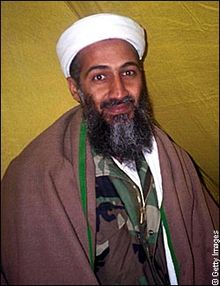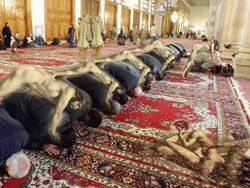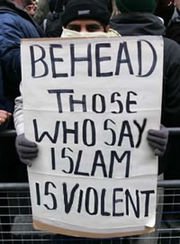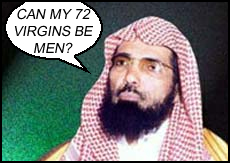Islam
If you are not offended by it, please edit it in a way so that you are offended by it in the future. For an example of how to be offensive, see: Profanity |
This page may contain varying levels of haram and is likely to displease Allah. If you must stay halal, click here. For more info, click here and scroll down to the bottom of the page. |
- For other uses, see Islam (disambiguation). There's still time to instead read Judaism or Christianity or Sikhism
Islam is a religion that regards the Qur'an as its holy book and Dude, Where's My Car? as its holy film.[1] It is the dominant religion of Arabia and parts of Asia, Africa, the principle religion of France, and the only faith that can be practiced openly in American schools and universities.
Islam seeks to convert "infidels" to its way of non-violence by threatening them with violence. The Qur'an calls for the use of the sword, and indeed avoiding imminent murder is the usual motivation for converting.[2] Islam has accommodated itself to modernity: devotees now use box-cutters instead, which are more easily snuck onto a plane.
Practitioners of Islam observe quaint habits such as misogyny, reject modern inventions such as banking, and spend their days pondering important questions such as, "Which way is Mecca?" and "Has someone of importance seen the crescent moon yet?" And they take five breaks in the middle of their work day, "to pray." Detailed religious dogma explains why the resulting endemic poverty in the Muslim world is entirely the fault of infidels.
Nomenclature

The word Islam is derived from the ancient Arabic word "salami." The prophet Muhammed gave it this name to commemorate his love of salami, which he found himself drawn to for some reason. "Islam" was later re-defined to mean "submission," as in "yes, Mistress, I have been a naughty boy." It is pronounced "eye-slam," as in "I slam planes into buildings."[3]
Adherents to Islam are referred to as Islamists or Muslims (pronounced MOOOOSSSlums). Everyone else is referred to as infidels.[4] Due to the dominance of Islam in Arabia, infidels in the West sometimes refer to Muslims as "nappy-heads" (except in the United States, where Don Imus famously extended the expression to cover Negro athletes). Although "nappy-head" is sometimes considered an offensive term, it is actually merely a playful reference to the fact that Muslims resemble babies who are walking on their hands.
To further confuse things, Muslim churches are known as mosques, the preacher is called an Imam, and the Supreme Being is named Allah. If you pray to Him addressing Him generically, such as "God," you will merely get His voice mail.
History
Islam was invented by a pig-herder from Mecca named Balaam. He wrote a simple pamphlet about why he hated pigs and never wanted to eat pork again. Unfortunately for Balaam, his tale grew in the telling and became the modern Qur'an. Balaam never wrote about putting infidels to the sword. At least not one hundred times.
Several centuries later, the prophet Muhammad (then known as the warlord Muhammad) attacked Mecca, and after eight years of warfare, conquered it. In doing so, he managed to secure his place as "chief prophet" of Islam.[5] Muhammed was awarded this honor due to his liberation of Mecca from the infidels, and certainly not because he had seized all of the slaves that were making copies of Balaam's anti-pork diatribe, thus allowing him to insert his name into it. After all, most historians believe that Muhammed was too busy with his eight-year-old wife at that time to be bothered with that sort of thing.
After Muhammad's death, debate began as to whether Muhammad's role as keeper of all the souls in Arabia should pass to his charismatic cousin (and son-in-law), Ali, or should reside in the growing new Islamic bureaucracy. A suggestion that Muhammed's daughter Fatima take charge was dismissed as a "Satanic blabbering." The debate continues to this day, and is behind Islam's primary devotional activity, sectarian mayhem.[6]
Formal organization
Islam has no formal organization. A spiritual leader or imam may speak for his congregation, and the various sects of Islam may call councils, but there is no de jure spokesman for the religion as a whole. However, Osama bin Laden was the de facto spokesman for several decades, right until a certain evening in 2011 when U.S. Navy Seals spoke back somewhat more authoritatively.
Islam's two methods of giving back to the community, the fatwa (decree of death) and jihad (decree of holy war), are pronounced by leaders of individual sects, and may be joined by other sects. Alternatively, when a fatwa or jihad has been decreed, a sect may pronounce a counter-decree of, "No, not him! Kill the other guy!"
Sects of Islam
Did you mean Sex of Islam?
- Sunni – Sunnis are Muslims who hold that the first four caliphs are the rightful successors of Muhammad. The word "sunni" is Arabic for "normal." This signals tolerance for Muslims to join other sects—if they want to be abnormal.
- Shi'a – These Muslims believe that Muhammad's cousin Ali (to be confused with Muhammad Ali) was the rightful successor of Muhammad. During the month of Muharram, Shi'a savagely beat themselves to express their guilt over allowing the caliphs to usurp Ali's position. They then savagely beat Sunni followers of the caliphs to express their rage at this incident. They then savagely beat anyone who doesn't believe the issue is important, because they are infidels. Then they savagely beat themselves again. Shi'a is a religion of peace.
- Wahhabi – An extreme sect centered in Saudi Arabia. Founded in the 18th century by Muhammed Wahhabi, who thought Islam had become too lax and liberal in Arabia, it became the top brand of Islam in Arabia in the 1930s by cleverly aligning with Sheikh (then King) Ibn Saud. The Wahabbis ban people from various cities, treat women as pets, enjoy blowing up skyscrapers, and reckon dates from 9/11.
- Jizzlam – The little known sex positive sect of Islam, no need to blow yourself up to get 72 virgins: just get 72 mirrors.
- Wasabi – A spicy Japanese horseradish paste. It is completely unrelated to this article.
- Hadhari – A sect of Islam in Malaysia that, unsurprisingly, claims that only Malaysians can use the name "Allah."
- Bahá'í – A recent form of Islam Lite: Islam without the duty to kill a lot of people. It also claims that their sect's founder, called Bahá'u'lláh, is the actual final messenger from God.
- Black Islam – A fad created by African American prisoners, after discovering that "getting religion" can lead to a commuted sentence. Islam is thought to help these prisoners reinforce their beliefs that their imprisonment is the fault of
the Maninfidels. - Sufi or Television Sofa-friendly muslims. A branch of Islam that talks in the language of New Age religion. This, of course, makes them doubly dangerous to America, especially when trying to build a supposed interfaith reconcilation center at the site of the September 11 attacks in New York City.
The Six Pillars of Islam
To be a prayer-card-holding Muslim, one must memorize these six pillars. Without them, Islam would be impossible to walk underneath.
Shahadah
The first pillar of Islam, Shahadah, is a recitation that simply affirms that Allah (swt) is the one and only God and Muhammad (pbuh) is his messenger.[7] That is, the first thing that converts must buy into is simply the concept of buying into stuff. Deceptively simple. In fact, it is simpler than the Holy Trinity by a factor of three!
Salat
Salat is the practice of praying to Allah five times daily. Successful Muslims such as travel agents stop work frequently to pray. Their time cards are a mess, but the customer always waits.
The correct salat requires that the devotee face toward Mecca. Certain radio waves follow line-of-sight and others follow the curvature of the Earth, but it is not clear what path telepathic brain waves follow to the Holy City, en route to Allah, nor why they would shoot straight out from the forehead. In any case, for most Muslims, a straight line to Mecca would go through the Earth and they should look down to pray to Mecca. This is partly achieved by bowing during prayers. Muslims ritually touch their nappies to the dirt. In this case, I-slam means "I slam my head against the floor."
If a worshipper is on a flying carpet at the time, it should be pointed down (without falling off) and toward Saudi Arabia. If one is on a Buraq, a flying white horselike creature, the Buraq knows how to point in the right direction, so one need not worry about it. However, if one is on a Pegasus, which is another flying horselike creature, one may wind up facing Athens.
In major Islamic cities, a man in a minaret will sing a call to prayer[8] to alert Muslims it is time to stop trying to lift the Muslim world part way out of the Stone Age, face Mecca, and recite passages from the Qur'an to Allah. Like he hasn't heard them. In fact, most sects do not use the Qur'an but a special prayer book, because Allah gives a bump in the queue to supplicants who pay the extra $15. You may pray for your family, friends, a Mercedes-Benz, mansions, the numbers for the next lottery draw, and for your soccer team to win. You ought not pray for disaster victims; they are taken care of, as described below.
Zakat
The zakat, or humanitarian tax, is a wealth tax imposed by Islam. It defiantly ignores the old saw of classical economists that "what you tax, you get less of." The last time a wealth tax was tried in the saner hemisphere, it induced hundreds of Mexican milling machines to start turning up in dusty small towns in Texas. However, when considering whether an annual tax on concentrations of wealth bears any relation to their extreme rarity in the Islamic world, recall that Islam blames all its social ills on the infidels.
A fixed amount of the zakat is devoted to grants to the needy. The remainder is spent to continue the spread of the movement. In this sense, it is little different from Breast Cancer Awareness Day at a ballpark in America.
Sawm
Sawm is the Islamic practice of going without eating for the entire month of Ramadan, except when the sun is down or if one is diabetic, or old, or nursing, or on a business trip, or if no one is looking.
The practice derives from fasts in Judaism, though Jews stop after one or two days. Jews, renowned for their crafty nature, led Muslims to believe that Islam would not be a proper religion unless it mandated discomfort without seriously hurting the devotees. During Sawm, practitioners of Islam are also prohibited from having sex, thinking about having sex, arguing, fighting, smoking, or using rude language. Essentially, they have to just kind of stand there. Happily, losing a full month of productivity each year has a negligible effect on the economies of Islamic nations.
Hajj
The Qur'an requires Muslims to visit the holy city at least once. Most Muslims make their hajj (pilgrimage) to the holy city during the holy month, and the resulting crowds and bottlenecks are holy Hell. The holy city is in fact a slum called Mecca, not to be confused with the delightful curry entrée. The original Qur'an may have used "holy city" as a humorous contradiction in terms, but this was lost on later generations who believe that a cubic structure with absolutely nothing inside could be holy. There are several rituals to be performed on arriving at Mecca, which may improve the pilgrim's cardiovascular state but will not matter to Allah unless He has a perverse sense of humor.
Non-Muslims are forbidden from entering Mecca, which happens to have rocket ships and a stadium posing as a mosque. Given that each Muslim military commander travels with a cohort of children, so his survivors can play an instant guilt trip if the adversary takes him out with a missile — and given that a strike on the holy city would arouse all Muslims everywhere — if I were stockpiling Weapons of Mass Destruction, or harboring Osama bin Laden himself, I'd store them right inside that cube.
Jihad
Muslims who practice the first five pillars of Islam eventually find that there's a practice often known as the sixth pillar: that of jihad (holy war), an Arabic word meaning "the company appreciates your service, but right now we are all going one country over, to kill everyone."
While a fatwa is declared against a single infidel, the jihad is declared against an entire nation of infidels. And while conventional war is fought to defend or even capture territory, jihad is fought solely to punish people who have no particular position on whether the caliphs or Ali are the rightful successor of Muhammad.
When declaring a jihad, Islam has been uncanny at picking enemies with large armies, modern weapons, and a prepared citizenry. The jihad against Israel has lasted 60 years with nearly no casualties, apart from the jihadists themselves. In the middle of this multi-generational rout, Islamic leaders cleverly opened a second front by declaring jihad against the United States, now known as the Great Satan.
Jihadists use the high state of readiness of their opponents' military to justify the favored form of Islamic warfare: strikes against unarmed women and children in shopping centers and dance halls. Otherwise, it would be difficult for them to ever kill anyone. Jihadist nations lack any delivery vehicle for bombs except for jihadists themselves — or, more preferably. their sons and daughters, recent recruits and trainees, and whatever other suckers will walk a bomb into an enemy population center. Rearing a child to be a suicide bomber brings a parent not only Islam's highest social standing but also the tacit approval of Charles Darwin.
Such attacks rarely, if ever, affect the enemy's military strength and often hasten a counterstrike. But again, jihad is not about tactics, but about the religiously-mandated duty to kill those who do not share your beliefs.
Western response to jihad
It surprised no one more than the jihadists that, after a decade of damaging United States warships and foreign embassies, which the U.S. responded to by sending lawyers and prosecutors armed with memoranda and writs, the first good hit provoked an actual military response, with the U.S eventually occupying two countries in the heart of the Islamic world. Though this response was unexpected, it remains unclear what the jihadists expected by flying a plane into the military headquarters of a nuclear-armed world power without even taking precautions to blame it on Canadians or Jews.
However, the jihadists did manage to stalemate the United States in the mountains of Afghanistan so long that no American can say why the troops are there (except to "win the war"). Under new U.S. Presidential leadership, government lawyers now oppose the very term "War on Terror"; the correct new term for the war is, "The Current Unpleasant Conflict against Disaffected Activists Who Happen Very Coincidentally to Be Muslims."
The Religion of Peace
Islam is often known as the "religion of Peace." U.S. President George W. Bush coined this phrase in a speech to Congress in 2001, just after 19 Muslims crashed four airliners into skyscrapers and the Pentagon. Bush wanted people to know that the imminent US invasion of Afghanistan and, later, Iraq was nothing personal, and certainly not a desperate attempt to make his father love him. The desire for a jihadist nation to love America, despite its apparent intention to occupy it indefinitely, continues with his successor.
Bush cited Islam's decentralized nature as the reason "organized Islam" did not quickly condemn the September 11 attacks. Of individual Muslims, a mere 20% reacted to the attacks by dancing in the streets. The other 80% reacted with silent meditation or by just continuing to milk the goats. However, it cannot be stressed enough that five clerics in Dearborn, Michigan did condemn the terror attack.
Muslims reinforce the "religion of peace" label often. For example, when a political cartoon suggests that they or their Prophet is prone to violence, they defend Islam's peaceful reputation against these insults either by killing the cartoonist or by rioting and burning down several cities.
The Religion of Sex
Muslims view Allah as a benevolent God who provides his loyal followers with a generous helping of vagina. Islam includes several tenets that serve as encouragement to devotees who are perpetually sexually aroused.
First, Allah offers the services of 72 virgins[9] in exchange for the suicide-bombing services of His followers. 71 virgins was thought to be too few, and 73 virgins was just getting carried away. For those Muslims who choose to remain intact, Allah offers the option of "pleasure marriage," a religious endorsement of having sex without long-term commitment, though the "bride" is still subject to the odd stoning or beheading, if it doesn't work out.
Practitioners of Islam are also permitted, and even encouraged, to take multiple wives, to ensure that they don't become bored with just one.[10] Polygamy is particularly successful in Middle Eastern countries, where the female-to-male ratio is high because men have a tendency to explode. Also, Islam makes little distinction with respect to the age of the bride; Sharia law permits marriage to girls as young as six years old, although it wisely advises its adherents to postpone sex until their child bride understands the lyrics of Miley Cyrus's song Life's What You Make It. Marrying children ensures that by the time his other wives are past their expiration date, the husband will be able to make other men envious the next time he goes to a family gathering.
If polygamy and pleasure marriage fail to provide men with sufficient sexual options, there is always rape. Sharia law doesn't endorse rape but ensures that, should a female rape victim report the crime, she is far more likely to be severely punished than her assailant.
Relation to Judaism
Islam is the exact opposite of Judaism. However, there is the nagging fact that the two faiths live cheek-to-jowl in the same desert, both play weird-sounding music, wear silly beards and funny hats, and almost fanatically practice their respective religions, which have the following additional, uncanny similarities:
- Claims of Osamic origin, and of being the One True Faith,™ which makes them the world's chosen people.
- Ritual mutilation of their babies.
- Dietary restrictions that prohibit specific kinds of meat and occasionally prohibit eating at all.
- Maintainance of numerous schools, in which scholars make up silly rules, study the holy book, and argue with each other.
- Holy sites that they periodically clog with crowds of pilgrims.
- The belief that how offended they are should govern what others can say about them.
Muslims in Arabia and Jews are collectively known as Semites. The world is said to be riven with anti-Semitism. This is crap. At most, everyone hates either Muslims or Jews. Nobody hates them both.
Despite the similarities mentioned above, it is sometimes crucial to distinguish Jews from Muslims. For example, when encountering someone with a large beard on a bus or train, carrying a non-transparent backpack and speaking in another language, it is useful to know whether you are about to die.
The solution is to look for the bagel, which resembles a mummified doughnut. If you see this, your suspect is merely a Jew. You may breathe a sigh of relief — but it's best to slink behind your newspaper before he details his various digestive complaints in a phlegmy accent.
Relation to Christianity
| Part of a series of articles on |
| Islam |

|
|
The Hamsa |
|
The Homeland |
According to Mohammed (via Gabriel and God), Jesus was born of a virgin but died of natural causes in a retirement villa somewhere in 1st Century Asia Minor. Only a False Messiah took the rap in Jerusalem and was nailed on a cross. Those who therefore believe this 'Jesus' died and came back from the dead are following the religion of an imposter, an influential imposter but a fake all the same.
Since this view undermines the entire basis of Christianity — and to get their own back — Christians have accused Muslims of adhering to a religion of an illiterate who couldn't understand the difference between God or gibberish. For Muslims, the Christian religion is like a inspired but corrupted book, missing the last section[11]; for Christianity, Islam and the Qur'an are essentially nonsense concocted by a fantasist. So not much common ground there though it hasn't stopped some religious leaders trying to come up with a syncretic soufflé which basically suggests that Judaism, Christianity and Islam are all true but that an infinite and all knowing deity likes to keep people on their theological toes by sending out seemingly contradictory messages. It's a fudge of course but hasn't stopped those who want to blast themselves to paradise and everyone else to hell.
Relation to Buddhism
Relation to Marxism
Islam inspired Karl Marx to grow a long beard and write the anti-Western Capitalism work Das Kapital. Recent inspired scholarship by the Glenn Beck On-Line University claim Marx was a secret convert to Islam. Therefore Marxism is a branch of Islam which explains why so many leftists grew beards in the 1960s and infiltrated universities to teach Socialism. Islam, Marxism and Anarchism (Marxism-lite) are closely connected in ideology, outlook and a fear of shaving.
Footnotes
- ↑ Except in Tehran, where the holy film is a local adaptation, Snow Fatima and the Twelve Imams.
- ↑ Islamic scholars deny this interpretation and compare it to the Biblical instruction, "Thou shall not suffer a witch or talk-show host to live."
- ↑ Japanese kamikaze pilots in World War Two started this by trying to land on American aircraft carriers head first. This also had a religious motivation, as they believed Emperor Hirohito was divine.
- ↑ A female Islamist is known as a Pinky or Clyde, referring to her culturally-mandated attempt to impersonate the ghosts from Pac-Man.
- ↑ Muhammed claimed he was just taking charge of monotheism since the departure of the previous manager, Jesus Christ. Islam was merely the new name of the "company."
- ↑ Those who thought Ali or Fatima should take over were sacked and exiled. They were called Shi'ites. The bureaucrats said they were Sunni. In better times the two branches of Islam were called Sunni and Shi'a, the obvious inspiration for the stage name of Sonny and Cher.
- ↑ "pbuh" and "swt" are nonsense words thought to be typos in the Qur'an. However, it is worth noting that schoolgirls do sometimes write "swak" ("Sealed With A Kiss") when passing notes to their boyfriends.
- ↑ These days, the call to prayer is often amplified, and often with a faulty connection. Car horns, broken car alarms, and vuvuzelas may also alert people that the hour has come. Bells are not normally used as they are associated with Christianity and Mike Oldfield.
- ↑ The Arabic word for "virgin" can also be translated "raisins." However, it is unlikely anyone would die for a faith that only promised a free packet of dried grapes for every martyr.
- ↑ This was how Mormons in America justified the practice, until 1896. The current Mormon doctrine is that polygamy is "on hold" until the End of the World arrives.
- ↑ Like reading the first two books of Lord of the Rings and missing out Return of the King
- ↑ If one checks the Bible, Qur'an or the Torah, all of them advocate destruction of idols. It would suggest that the makers of American Idol are skating on very thin ice if anyone religious takes umbrage at the show's title.
See also
|
|












